

The Koch brothers entered California’s political fray September 14, a Friday, with a $4 million donation to a new pro-Proposition 32 political entity called California Future Fund. By Tuesday, September 18, the fund had released its first TV spot, titled “Telephoto.” What does $4 million in Koch cash buy? Let’s take a look at this half-minute spot, shot by shot.
00 min. 01 sec. – If we had millions of dollars of Koch brother money, maybe we could afford a telephoto lens too.
00:06 – Clearly not shot with a telephoto lens. Thematically, the scene should have been shot through the open window. Instead, our supposedly heroic cameraperson with a telephoto lens of moral clarity is physically inside the room with the shady suits. They look quite comfortable with his presence. A perfect metaphor for Prop. 32.
00:10 – “Big corporations and government unions control politicians,” our ominously-voiced narrator tells us.
» Read more about: Framed: Proposition 32's Deceptive TV Ad »
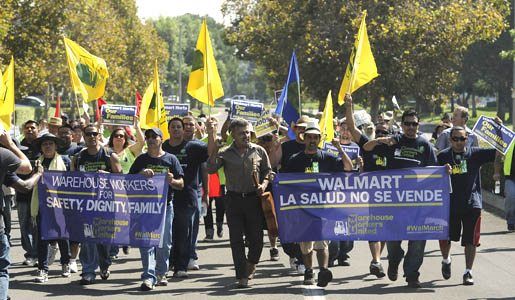

By the last mile through the grid in Downtown Los Angeles, the long, hot stretches of dusty San Bernardino County were a distant memory for 50 warehouse workers and supporters who marched 50 miles in six days from the Inland Empire to the city center.
Walking through the summer heat, warehouse workers who move Walmart merchandise took their protest for better working conditions out of the shadows in Riverside and San Bernardino counties and into LA. On the final day of the WalMarch, weary marchers, who slept on church floors and dined on the good graces of supporters, were met by hundreds of supporters on the steps of LA City Hall.
“We became a family along the way,” said David Fancote.
After several appeals to Walmart and its contractors to end retaliation and fix poor working conditions at one warehouse dedicated to moving Walmart goods in Mira Loma,
» Read more about: WalMarch Ends, But Warehouse Strike Continues »


 We all learn many important lessons from our parents. One lesson that I learned from my father was this: If you cut through a pipeline that’s carrying raw sewage you should be really, really sure that it’s not under pressure before you start. Unfortunately, this was something I discovered through actual observation when my father tried to fix our septic system and was sprayed down with a putrid stream of human waste as a reward for his efforts.
We all learn many important lessons from our parents. One lesson that I learned from my father was this: If you cut through a pipeline that’s carrying raw sewage you should be really, really sure that it’s not under pressure before you start. Unfortunately, this was something I discovered through actual observation when my father tried to fix our septic system and was sprayed down with a putrid stream of human waste as a reward for his efforts.
This is the type of home repair that I, now an Angeleno, never need to make on my own. Because I am currently a fancy city-dweller, I no longer have to take my trash to the dump, fix potholes in the road or do all of the other chores that are part of everyday country life but are magically taken care of when one lives in the city.
Not only do I get to avoid these day-to-day chores,


NRDC [Natural Resources Defense Fund] and Move LA released a report today touting the expansive benefits of sustainability planning in three of California’s largest cities—representing nearly two-thirds of the state’s population. The report explores how Los Angeles, Sacramento and San Diego are already building the cities of the future thanks to the Sustainable Communities and Climate Protection Act, or SB 375, authored by Senator Darrell Steinberg in 2008.
Four years ago, SB 375 was nothing less than a revolution in the way California plans for growth. It linked regional transportation planning to reducing greenhouse gas emissions, encouraging a wide range of travel options and giving Californians the kinds of communities they want.
Our analysis found that enacting SB 375 into law was an achievement that distinguished California as a national leader in creating communities that meet both our economic and environmental challenges.
» Read more about: SB 1156: A New Tool for Sustainable Development »

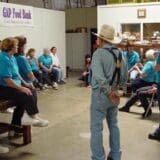
The U.S. Census Bureau released the American Community Survey yesterday, and the broad study of poverty, inequality and youth mobility failed to present strong evidence that the recession has fully subsided. Instead, the study tells a familiar tale of winners and losers in the wake of the recession.
According to the report, poverty increased between 2010 and 2011. NPR reports on the findings:
The number of Americans living in poverty grew to 15.9 percent in 2011. It was 15.3 in 2010. That means that 48.5 million Americans had an income below the poverty level.
Poverty increased by greater margins in the three years prior, but the uptick, however slight, casts real doubt on an economic turnaround. Notably, an additional 2.3 million would have fallen into poverty without 2011′s extended unemployment benefits, and the poverty rolls could expand as jobless benefits expire.
In addition,
» Read more about: Recession Still Very Real for Americans »


Many of you have been following LAANE and its partners’ effort to protect Chinatown from Walmart, which is pursuing a strategy to get into urban areas across the country including Boston, New York, Washington, DC and Chicago. Over the last six months, thousands of people in L.A. have marched against Walmart, community groups have appealed their building permits and a moratorium on large chain stores in Chinatown is pending. Across the nation, Walmart workers have organized creative actions against Bentonville shareholders and community groups have launched rallies and even flash mobs to hold the retailer accountable.
Yet many here in L.A. fear it is not enough to stop Walmart. After all, Walmart was able to get its building permits issued by a department known for moving slower than a glacier less than 24 hours before a looming moratorium. And why did they need those expedited permits—was it really that urgent to begin construction on a Walmart store in a space that had been vacant for 20 years?
» Read more about: Brooklyn Tells Walmart to “Talk to the Hand” »


 In 15 days, food stamp benefits will be cut by some 20 percent, thanks to Republicans in Congress who tossed this mean-spirited gem into one of GOP’s hostage bills that President Obama was forced to sign because a veto would result in the government shutting down, or the US reneging on its bills, or something equally destructive.
In 15 days, food stamp benefits will be cut by some 20 percent, thanks to Republicans in Congress who tossed this mean-spirited gem into one of GOP’s hostage bills that President Obama was forced to sign because a veto would result in the government shutting down, or the US reneging on its bills, or something equally destructive.
On October 1, millions will see their benefits stripped away or cut greatly.
Most unemployed people will get cut off. Many working poor, who rely on food stamps to make ends meet, will go hungry. So, too, will countless military families – a separate disgrace in and of itself. Far too many homeless families and individuals will find their chair at the dinner table yanked away just as they are sitting down to eat, a sight gag that hasn’t been funny since it was pulled on Fatty Arbuckle in some of his movies back in the Twenties.
» Read more about: Food Stamp Cuts on the Line in Congress »


 Political money is a featured dish on the spending menu of Tampa-based Outback Steakhouse restaurants. The chain was controlled by Bain Capital until last month, when its parent, Bloomin’ Brands, went public in an Initial Public Offering. Bain and its investors stand to earn an estimated 88 percent return on their investment in the company.
Political money is a featured dish on the spending menu of Tampa-based Outback Steakhouse restaurants. The chain was controlled by Bain Capital until last month, when its parent, Bloomin’ Brands, went public in an Initial Public Offering. Bain and its investors stand to earn an estimated 88 percent return on their investment in the company.
Almost everyone now knows Bain’s critical role in building Mitt Romney’s wealth as a leading light of the 1 percent. And, Ann and Mitt Romney are investors in the particular Bain fund that bought and then sold Bloomin’ Brands.
But few noticed that Outback’s Political Action Committee (OSI PAC, also known as OSI Restaurant Partners) this year emerged as the restaurant industry’s biggest political donor. So far in 2012, OSI PAC has given more money to political candidates than the PACs of any of these bigger and better known firms: Coca-Cola, McDonald’s, Pepsi,
» Read more about: Low-Wage Sizzle: Outback Steakhouse PAC »


Why does California reward ultra-rich companies that move jobs out of the state?
We’ll tell you why. In 2009, during secret, behind-closed-doors budget negotiations, a handful of state legislators and Gov. Schwarzenegger snuck in a colossal but little-known corporate tax giveaway into the budget in the dead of night. This loophole, known as the “elective single sales factor,” gives corporations the option to reduce the taxes they pay to California by keeping jobs and investment in other states – giving companies a huge incentive to hire outside of California. The loophole has already cost the state tens of thousands of jobs, and the only ones who are benefitting from it are California’s richest corporations. In fact, 80 percent of the benefits from this loophole go to the 0.1 percent of California corporations with gross incomes over $1 billion.
It’s high time we end the practice of shelling out taxpayer money to ultra-profitable companies that kill California jobs.
» Read more about: Proposition 39: Bringing Jobs Back to California »
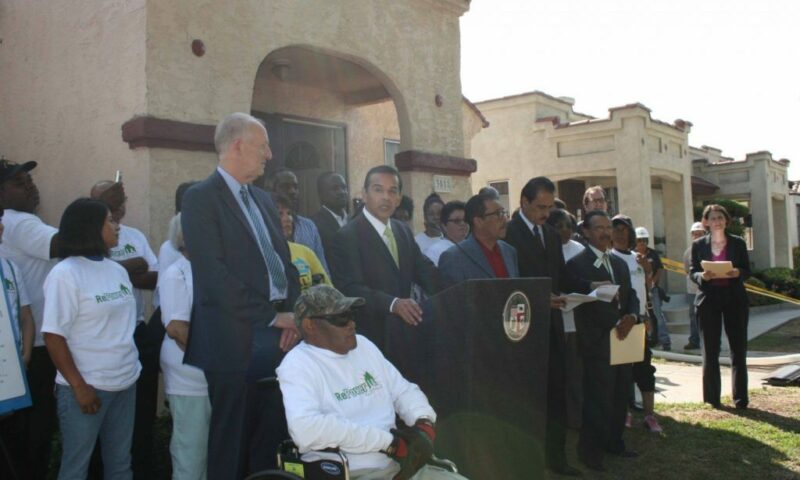
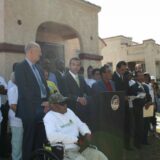
Los Angeles, long fighting its reputation as one of the least green cities in the country, is making real changes to improve its standing.
City leaders and members of RePower LA gathered Monday, September 17, to recognize the City’s major strides in energy efficiency. The event took place at a South L.A. home while workers demonstrated an energy efficiency upgrade on the residence. It was part of a Department of Water and Power (LADWP) program championed by the RePower LA coalition. Mayor Antonio Villaraigosa, City Council President Herb Wesson, Councilmember Richard Alarcon, DWP General Manager Ron Nichols, business leaders and residents each spoke about the importance of energy efficiency and job creation, particularly in the current economy.
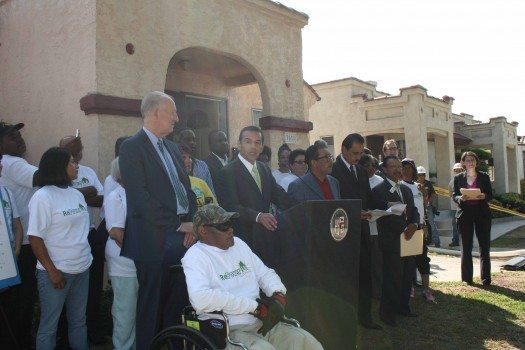 “We’re proud to announce a renewed commitment to energy efficiency from the Department of Water and Power,” said Mayor Villaraigosa. “DWP has proposed to more than double its energy efficiency budget.
“We’re proud to announce a renewed commitment to energy efficiency from the Department of Water and Power,” said Mayor Villaraigosa. “DWP has proposed to more than double its energy efficiency budget.